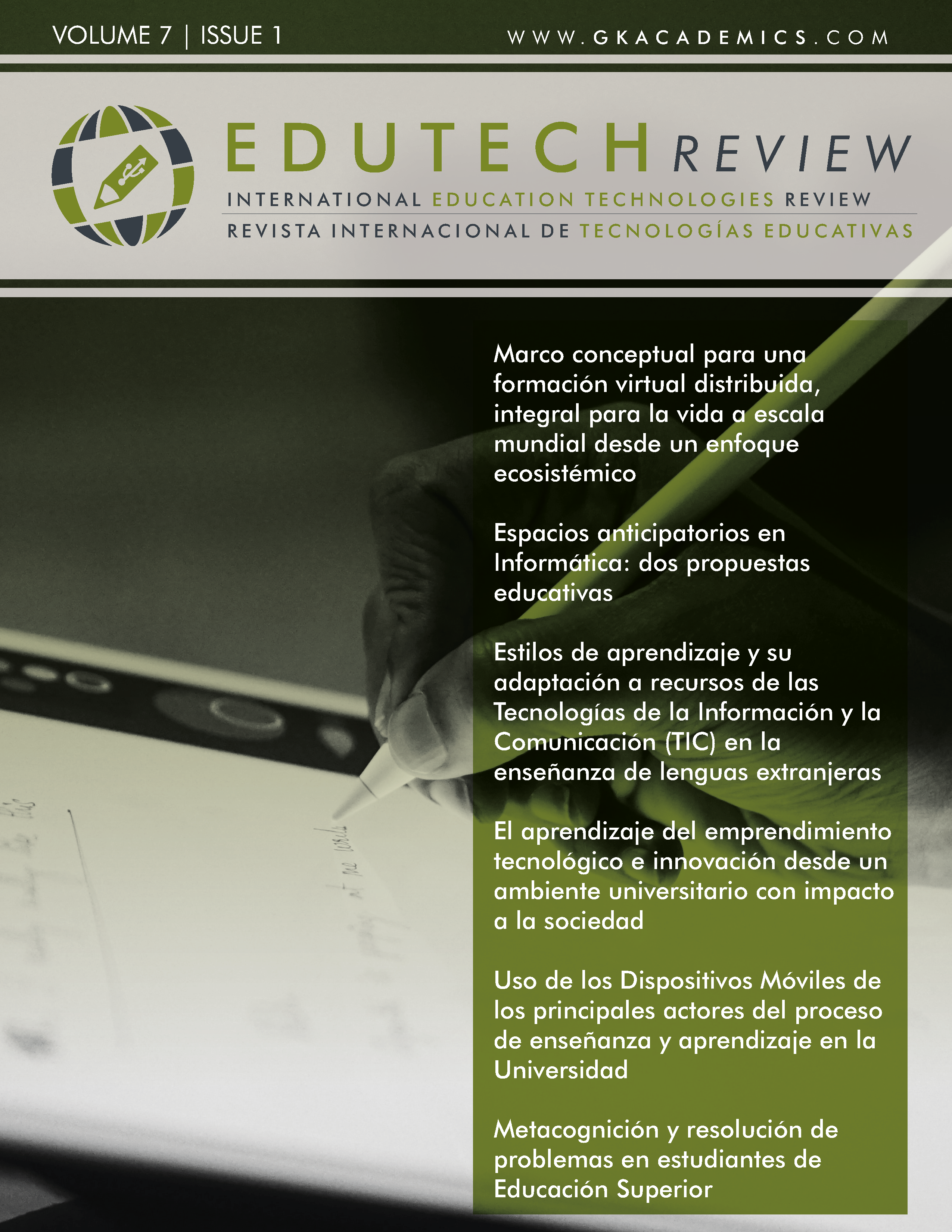Learning Styles and their Adaptability to Information and Communication Technologies in Foreign Language Teaching
DOI:
https://doi.org/10.37467/gka-revedutech.v7.2458Keywords:
Learning Styles, Adaptation, ICT, Foreign Languages, TeachingAbstract
Virtual learning is offered to students as part of didactic programs where tasks performed through ICT may not consider the variety of existing learning profiles or styles and turn out to be not sufficient for some of the learners. The study presents the use and profile of the different learning styles applied to foreign language teaching and their interaction with didactic materials in regard to the use of ICT resources and their different applications.
References
Abreu, J. (2012). Hipótesis, método & diseño de investigación (hypothesis, method & research design). Daena: International Journal of Good Conscience, 7(2), 187-197.
Aguilera, E. y Ortiz, E. (2009). Las investigaciones sobre los estilos de aprendizaje y sus modelos explicativos. Revista de estilos de aprendizaje, 2(4).
Alonso, C. M., Gallego, D. y Honey, P. (1999). Los Estilos de Aprendizaje. Bilbao: Ediciones Mensajero. Universidad Deusto.
Area, M. y Adell, J. (2009). E-learning: enseñar y aprender en espacios virtuales. En J. De Pablos (Coord), Tecnología Educativa. La formación del profesorado en la era de Internet. Aljibe, Málaga.
Casero, E.M. (2016). La importancia de las TIC para la enseñanza de idiomas en al aula intercultural (Tesis doctoral no publicada). Departamento de Filologías Extranjeras y sus Lingüísticas, UNED, Madrid.
Dunn, R. (1984). Learning style: State of the science. Theory into practice, 23(1), 10-19.
Franco, P.; Pino Juste, M.R.; y Rodríguez, B. (2009) Tipología y frecuencia del uso de estrategias en el aprendizaje del inglés como lengua extranjera. Enseñanza & Teaching, 27, 2, 171-191.
Honey, P. y Mumford, A. (1986). The Manual of Learning Styles. Berkshire: Ardingly: House.
Kartal, E. (2005). The Internet and autonomous language learning: a typology of suggested aids. Turkish Online Journal of Distance Education, 4(4), 54-58.
Kolb, D. A. (1984). Experiential learning: Experience as the source of learning and development (Vol. 1). Englewood Cliffs, NJ: Prentice-Hall.
Liu M. et al. (2013) A Study of the Use of Social Network Sites for Language Learning by University ESL Students. In: Lamy MN., Zourou K. (eds), Social Networking for Language Education. New Language Learning and Teaching Environments. Palgrave Macmillan, London
Mackey & M. Gass, 2005. Second Language Research. Methodology and design. Mahwah, New Jersey: Lawrence Erlbaum Associates.
McBride, K (2009). Social net-working sites in foreign language classes. Opportunities for re-creation. The next generation: Social networking and online collaboration in foreign language learning, 8, 35-38.
McLeod, S.A. (2017, Oct 24). Kolb - learning styles. Simply Psychology.
Molina, I (2016). Algunas herramientas digitales y su uso colaborativo en el aula de ELE. (2020).
Montes, J.M. (2005). Pautas y estrategias para entender y atender la diversidad en el aula. Pulso 28, 199-214.
Moreno, E. y Risueño, J. (2018). Design of a Checklist for Evaluating Language Learning Websites. Porta Linguarum, 30, 23-41.
Robles Garrote, P. y Rojas, M. D. C. (2015). La validación por juicio de expertos: dos investigaciones cualitativas en Lingüística aplicada. Revista Nebrija de Lingüística Aplicada 18.
Romero, M.A. y Crisol, E. (2012). Self-learning guides to teaching as a tool to support teaching.
Salas-Cabrera, J. (2014). Estilos de aprendizaje en estudiantes de la Escuela de Ciencias del Movimiento Humano y Calidad de Vida, Universidad Nacional, Costa Rica. Revista electrónica EDUCARE, 18(3), 159-171.
Son, J. B. (2011). Online tools for language teaching. TESL-EJ, 15(1), 1-12.
Vázquez, E. y Martín, E. (2014). Nuevas tendencias en la elaboración y utilización de materiales digitales para la enseñanza de lenguas. Madrid: McGrawhill Education.
Zayas, F. (2014). Problemas metodológicos en la enseñanza de lenguas extranjeras: ¿son las TIC una solución? Rastros Rostros, 16(30).
Downloads
Published
How to Cite
Issue
Section
License
Those authors who publish in this journal accept the following terms:
- Authors will keep the moral right of the work and they will transfer the commercial rights.
- After 1 year from publication, the work shall thereafter be open access online on our website, but will retain copyright.
- In the event that the authors wish to assign an Creative Commons (CC) license, they may request it by writing to publishing@eagora.org







